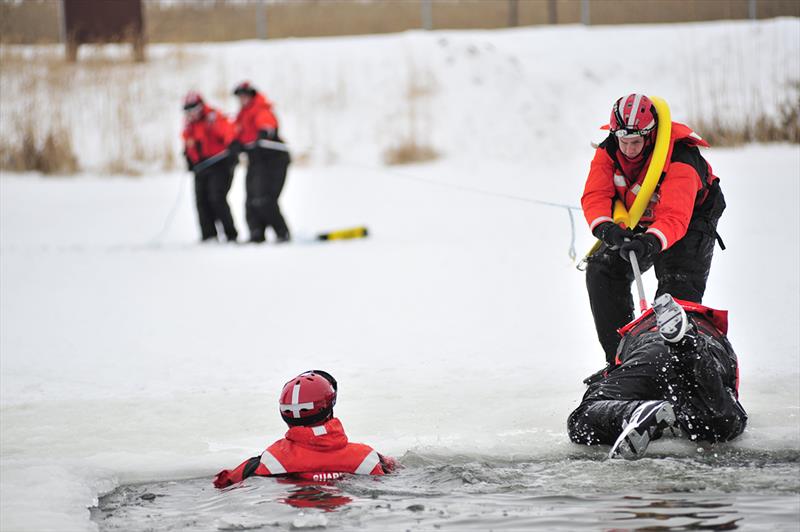
Seven tips to keep you safe on the water this winter
by LT Katie Braynard 10 Nov 2019 14:33 UTC

Coast Guard crews are trained in cold water rescue techniques, but knowing these crucial winter safety tips can help save your life! © U.S. Coast Guard
Regardless of the region in which you live, the winter season brings added tips to help you stay safe on the water. With colder air and water temperatures, it's crucial to be prepared for anything if you happen to be heading out on the water for any activity this winter -boating, kayaking, paddle boarding or even ice fishing and snowmobiling.
If you plan to participate in any water activity this winter - know what will keep you safe! Planning and preparation are key to any safe outing on the water, but also knowing some basic safety and cold water immersion tips can help save your life.
Here are seven tips to help keep you safe on the water this winter:
1. File a float plan
Filing a float plan can be as easy as telling a loved one where you are headed and when you plan to return. Leaving this crucial information with someone on shore can help rescuers narrow down where to look if you don't return when scheduled. If time allows, you should always try to fill out a completed float plan and update it as changes occur - every piece of information proves more helpful than you may think!
2. Always wear a lifejacket
Make sure the lifejacket is Coast Guard-approved and fits properly. Just as important as wearing one yourself, you should always make sure the people with you have one on as well. Even if you think having a lifejacket onboard your boat or you are a strong swimmer and need one, just wear it. It's so much easier to be prepared for the worst than reach for a stowed life jacket. There are so many different types of life jackets these days, you can easily find one that fits your needs and lifestyle to keep you safe.
3. Have some form of communication on you at all times.
On a boat, the easiest thing to have is a working marine-brand VHF radio and a handheld GPS. This will easily allow you to call for help and give rescuers your position if necessary. Cell phones don't always receive reception in the areas you may be going on your boat - so better to be prepared with extra equipment and not need it, than need it and not have it. The Coast Guard always monitors VHF Channel 16 for distress.
If you're staying close to shore on a kayak or paddleboard, the next best thing is to have a cell phone with you to call for help if something happens. Keep your cell phone along with your other valuables in a zip locked bag to keep them safe until you need to use them.
4. Dress for the water, not the air
Even though the temperature outside may be 60 to 70 degrees, the water temperature could be near freezing. It's always crucial to check the water temperature and know the proper protective equipment that will keep you warm in the worst case scenario.
5. Know the 1-10-1 principle
Knowing some basic cold-water immersion principles can greatly increase your chances of survival if something goes wrong. Although the times are approximate, in general you should try to remember 1-10-1:
1 - You have one minute after being submerged in water to get your breathing under control and realize what has happened. If breathing isn't controlled immediately, the possibility of drowning drastically increases. This is often referred to as the body's response to "cold water shock."
10 - After gaining your awareness, there are 10 minutes of meaningful movement to help someone self-recover. After ten minutes, it's likely the cold water temperatures will cause a loss of dexterity in fingers and arms, lessening the ability to recover yourself.
1 - There is approximately one hour until hypothermia will set in and someone could become unconscious.
6. Maintain situational awareness at all times
As a general safe boating tip, situational awareness should always be maintained when on the water. Whether it be knowing what is happening around the boat, keeping an eye on changing weather or even knowing where the boat is, good situational awareness can help a bad situation from getting worse.
7. Always be responsible and never boat under the influence.
Boating under the influence decreases overall situational awareness and lessens their ability to recognize dangerous situations before they occur. There should always be a designated boater when heading out. The safety of each person aboard the boat depends on it!
For more information visit the website.